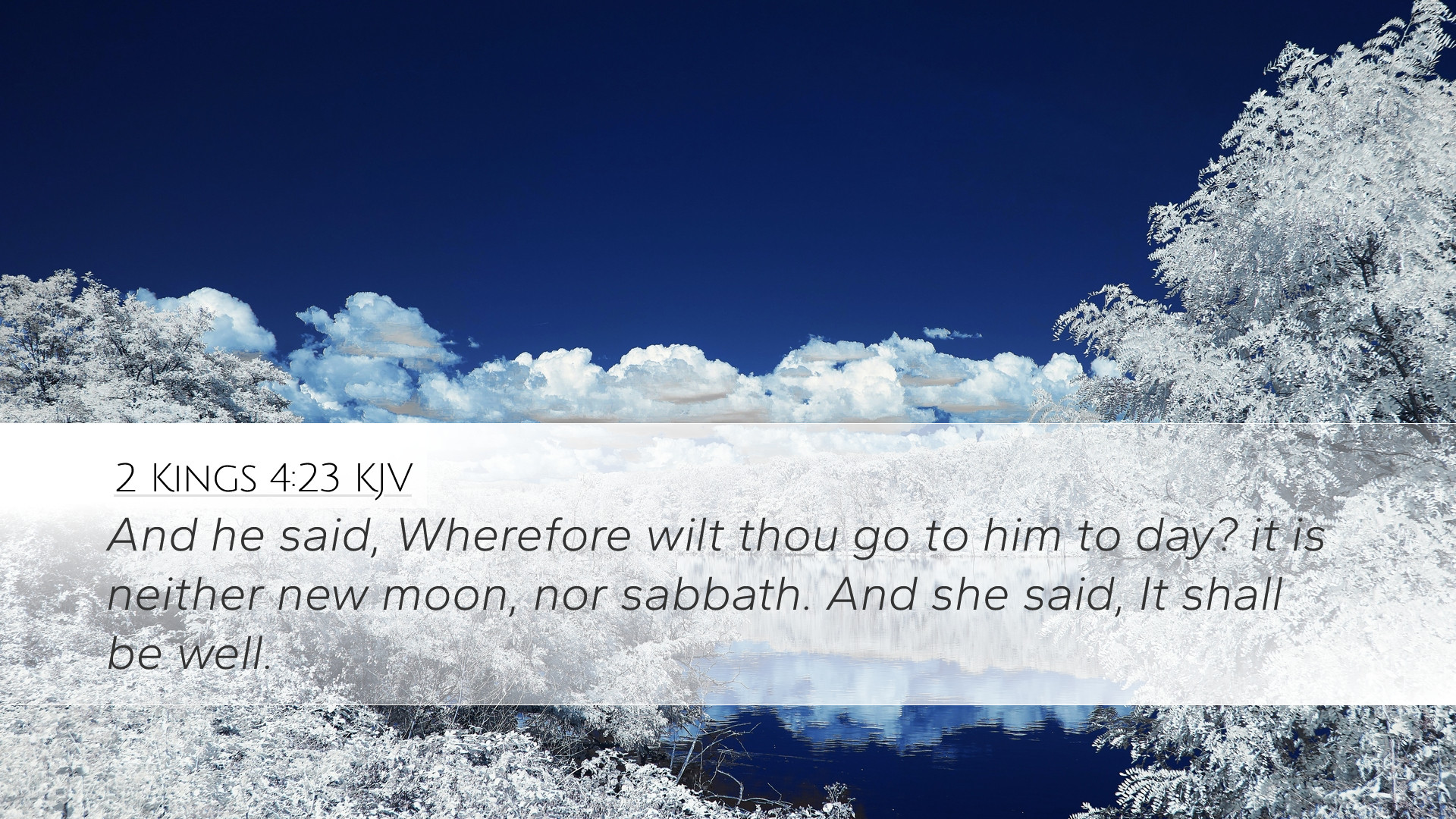Commentary on 2 Kings 4:23
Verse: 2 Kings 4:23 - "And he said, Wherefore wilt thou go to him to day? it is neither new moon, nor sabbath. And she said, It shall be well."
Context and Overview
In the narrative leading up to this verse, we encounter the Shunammite woman, a figure of faith and persistence. Her son, a miraculous gift from God through the prophet Elisha, has fallen ill, and she embarks on a journey to seek help from Elisha. 2 Kings 4 provides rich context regarding divine provision, faith amidst trials, and the nurturing relationship between God’s prophets and the people they serve.
Commentary Insights
Matthew Henry's Commentary
Matthew Henry expounds on the significance of the Shunammite woman's decision to seek out Elisha. He notes that her inquiry into the timing of her visit reflects a common understanding of worship practices. The query about it being neither a new moon nor a Sabbath indicates that she was not approaching Elisha for ritualistic purposes, but rather out of urgent necessity. Henry emphasizes the woman's resolute faith, as her response to her husband's question—“It shall be well”—demonstrates her deep trust in God's provision.
Albert Barnes' Notes
Albert Barnes highlights the cultural implications of the Shunammite woman's actions. He points out that her husband’s confusion signifies the normality of everyday life interrupted by the extraordinary circumstances she faced. Barnes interprets her statement, "It shall be well," as a profound expression of her steadfast belief, suggesting that she had the conviction that God would intervene despite the dire situation. This illustrates not only her personal faith but also serves as a lesson for believers facing crises.
Adam Clarke's Commentary
Adam Clarke offers additional details about the nuances of the woman's proclamation “It shall be well.” He suggests that her words were a declaration that permeated her entire being, a encapsulation of her faith in God’s omnipotence. Clarke indicates that she is not merely optimistic; she possesses a confident assurance that transcends the physical realities and emotional turmoil of her situation. Her faith serves as a paradigm for believers, encouraging them to trust in God’s promises, even when circumstances suggest otherwise.
Theological Implications
The verse serves as a critical touchstone for understanding the themes of faith and divine providence in the Old Testament. It reflects several key theological motifs:
- Faith in Crisis: The Shunammite woman exemplifies unwavering faith when confronted with tragedy. Her declaration can inspire believers to maintain trust in God during personal trials.
- The Role of Prophets: Elisha acts as a mediator between God and the people, suggesting a larger theme of divine revelation and the active role of God in the lives of His followers.
- Hope and Assurance: The phrase “It shall be well” encapsulates the hopeful assurance that is foundational to the Christian faith. It reminds believers of the promise of God’s comfort amidst turmoil.
Practical Applications
The narrative surrounding 2 Kings 4:23 offers several practical applications for pastors and theologians:
- Encouraging Faith: Like the Shunammite woman, believers are called to express their faith in God even when the situation seems hopeless. This can serve as a sermon topic that encourages congregants to deepen their reliance on God.
- Mentorship and Discipleship: The relationship between the prophet Elisha and the Shunammite woman reflects the importance of spiritual mentorship. Pastoral care can focus on developing mentoring relationships that encourage faith through life's difficulties.
- Community Support: The community aspect of faith—how individuals support one another in crises—mirrors the Shunammite woman’s reliance on her husband initially, before seeking divine intervention. This speaks to the necessity of community in spiritual journeys.
Conclusion
In 2 Kings 4:23, the Shunammite woman’s steady proclamation, “It shall be well,” transcends her immediate circumstances, positioning her as a model of faith for all believers. The insights from public domain commentaries bring to life the richness of her faith narrative, encourage theological reflection, and offer practical steps in cultivating such faith amidst crises. As we reflect on these themes, may we be strengthened in our own journeys of faith, leaning into God’s promises and providences.


